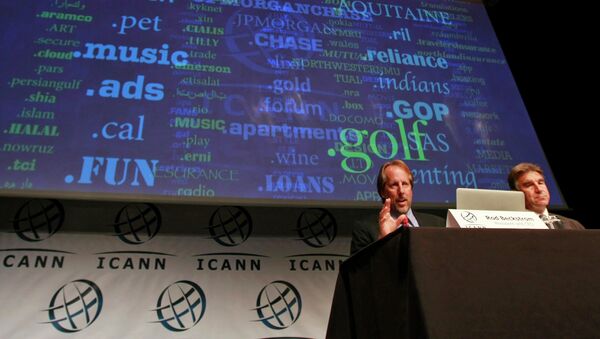NTIA, the US President's personal advisory body on technology, has approved a plan offered by ICANN [Internet Corporation for Assigned Names and Numbers] to end US-based oversight of internet protocols.
According to NTIA head Lawrence Strickling, the proposed plans meet criteria set by the US administration. Strickling declined to call his agency's report an "approval," referring to it instead as a favorable "assessment."
ICANN is the non-profit, US-based international corporation tasked with maintaining the global DNS system, the system that translates numeric IP addresses into textual domain names, like www.example.com, as well as many other standardized internet protocols. ICANN seeks to ensure neutral, independent and effective regulation over internet parameters, and assure that internet services are available to all.
Prior to 1998, one organization, Network Solutions, enjoyed a monopoly to provide domain names. ICANN created a competing domain name registration market and, today, remains formally under the supervision of the US Department of Commerce.
The new plan, proposed by ICANN in March 2016, and approved of by most tech giants, including Amazon, Google, Cisco Systems, Microsoft, Facebook, Hewlett Packard, the U.S. Chamber of Commerce, and the Computer and Communications Industry Association, involves a transition to a multi-stakeholder model, ensuring no single government entity can control the internet. According to a 2014 US government statement, the new model will ensure that ICANN will be controlled by all parties with interests in "vibrant and healthy Internet."
There are objections to the plan. Some Republicans in the US Senate believe that maintaining the US internet-overseer status quo will prevent undue online influence by non-allied enemy-state actors.
Senator John Thune (R-SD), however, said last year that ICANN was in danger of becoming "accountable to no one." Former republican presidential candidate Ted Cruz stated on June 8 that the US oversight of ICANN helps protect America, "from authoritarian regimes that view the Internet as a way to increase their influence and suppress freedom of speech." Senate Republicans introduced a "Protecting Internet Freedom Act" bill, that, if passed, would prohibit the transition of domain name system functions away from US oversight, unless expressly allowed by lawmakers.
Critics of US oversight say that an extension of US internet protocol control will bring what Cruz, and others, most fear, by encouraging other governments to impose more control over their segments of the internet.
"Governments that want to see the transition fail will use the extension and continued US government involvement as justification to promote further intergovernmental control over the internet," posted Matthew Shears, director of global internet policy at the Center for Democracy and Technology, in his blog. "The longer the US government retains its role, the more the voices against multistakeholder approaches and an open internet will grow."
If the ICANN proposal is approved by the government, the transition will happen this autumn, before the US presidential elections.




